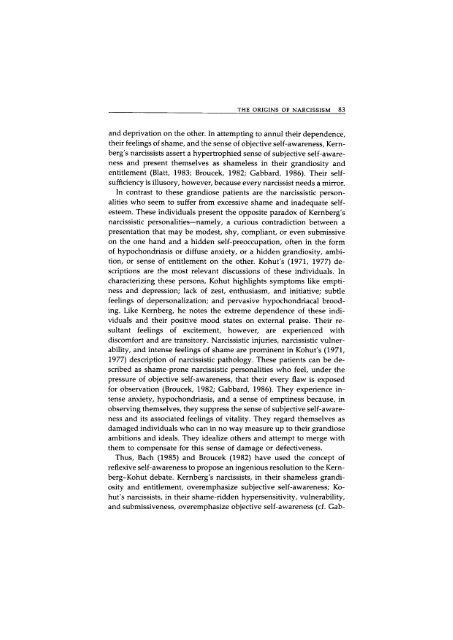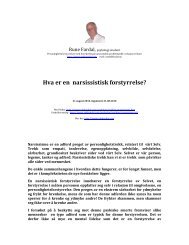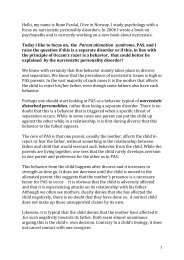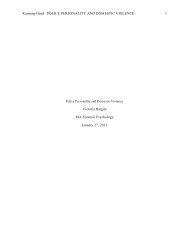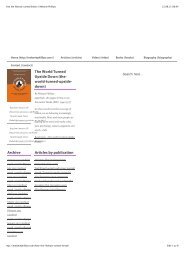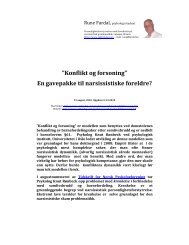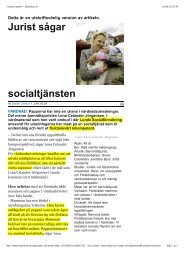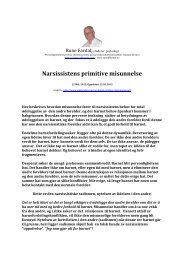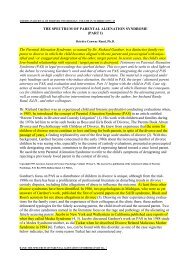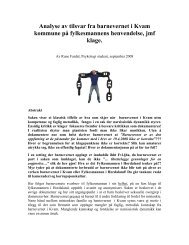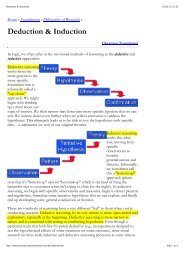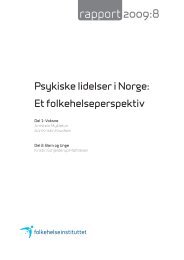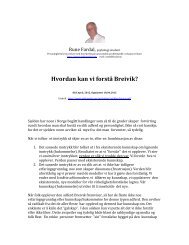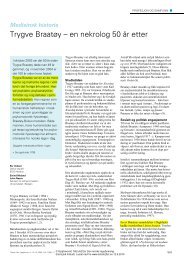The origins of narcissism and narcissistic personality disorder a
The origins of narcissism and narcissistic personality disorder a
The origins of narcissism and narcissistic personality disorder a
Create successful ePaper yourself
Turn your PDF publications into a flip-book with our unique Google optimized e-Paper software.
THE ORIGINS OF NARCISSISM 83<br />
<strong>and</strong> deprivation on the other. In attempting to annul their dependence,<br />
their feelings <strong>of</strong> shame, <strong>and</strong> the sense <strong>of</strong> objective self-awareness, Kernberg’s<br />
narcissists assert a hypertrophied sense <strong>of</strong> subjective self-awareness<br />
<strong>and</strong> present themselves as shameless in their gr<strong>and</strong>iosity <strong>and</strong><br />
entitlement (Blatt, 1983; Broucek, 1982; Gabbard, 1986). <strong>The</strong>ir selfsufficiency<br />
is illusory, however, because every narcissist needs a mirror.<br />
In contrast to these gr<strong>and</strong>iose patients are the <strong>narcissistic</strong> personalities<br />
who seem to suffer from excessive shame <strong>and</strong> inadequate selfesteem.<br />
<strong>The</strong>se individuals present the opposite paradox <strong>of</strong> Kernberg’s<br />
<strong>narcissistic</strong> personalities-namely, a curious contradiction between a<br />
presentation that may be modest, shy, compliant, or even submissive<br />
on the one h<strong>and</strong> <strong>and</strong> a hidden self-preoccupation, <strong>of</strong>ten in the form<br />
<strong>of</strong> hypochondriasis or diffuse anxiety, or a hidden gr<strong>and</strong>iosity, ambition,<br />
or sense <strong>of</strong> entitlement on the other. Kohut’s (1971, 1977) descriptions<br />
are the most relevant discussions <strong>of</strong> these individuals. In<br />
characterizing these persons, Kohut highlights symptoms like emptiness<br />
<strong>and</strong> depression; lack <strong>of</strong> zest, enthusiasm, <strong>and</strong> initiative; subtle<br />
feelings <strong>of</strong> depersonalization; <strong>and</strong> pervasive hypochondriacal brooding.<br />
Like Kernberg, he notes the extreme dependence <strong>of</strong> these individuals<br />
<strong>and</strong> their positive mood states on external praise. <strong>The</strong>ir resultant<br />
feelings <strong>of</strong> excitement, however, are experienced with<br />
discomfort <strong>and</strong> are transitory. Narcissistic injuries, <strong>narcissistic</strong> vulnerability,<br />
<strong>and</strong> intense feelings <strong>of</strong> shame are prominent in Kohut’s (1971,<br />
1977) description <strong>of</strong> <strong>narcissistic</strong> pathology. <strong>The</strong>se patients can be described<br />
as shame-prone <strong>narcissistic</strong> personalities who feel, under the<br />
pressure <strong>of</strong> objective self-awareness, that their every flaw is exposed<br />
for observation (Broucek, 1982; Gabbard, 1986). <strong>The</strong>y experience intense<br />
anxiety, hypochondriasis, <strong>and</strong> a sense <strong>of</strong> emptiness because, in<br />
observing themselves, they suppress the sense <strong>of</strong> subjective self-awareness<br />
<strong>and</strong> its associated feelings <strong>of</strong> vitality. <strong>The</strong>y regard themselves as<br />
damaged individuals who can in no way measure up to their gr<strong>and</strong>iose<br />
ambitions <strong>and</strong> ideals. <strong>The</strong>y idealize others <strong>and</strong> attempt to merge with<br />
them to compensate for this sense <strong>of</strong> damage or defectiveness.<br />
Thus, Bach (1985) <strong>and</strong> Broucek (1982) have used the concept <strong>of</strong><br />
reflexive self-awareness to propose an ingenious resolution to the Kernberg-Kohut<br />
debate. Kernberg’s narcissists, in their shameless gr<strong>and</strong>iosity<br />
<strong>and</strong> entitlement, overemphasize subjective self-awareness; Kohut’s<br />
narcissists, in their shame-ridden hypersensitivity, vulnerability,<br />
<strong>and</strong> submissiveness, overemphasize objective self-awareness (cf. Gab-


